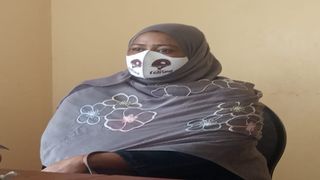
Fatuma Sicobo Mohamed who was in 2019 charged with trafficking heroin worth Sh7.3million has been jailed for life by a Shanzu court.
|News
Premium
Court cases point to more women entering drug trade
An increasing number of women at the Coast are now involved in drug trafficking, going by convictions and number of court cases in the region.
According to police and court records, more women are now getting into the drug business, with last week’s jailing of a 40-year-old woman laying bare the extent to which women are now getting involved in the vice.
But unlike their male counterparts in drug trafficking who live lavishly, investigations show women tend to lead a more simple lifestyle.
On December 15, Fatuma Sicobo was jailed for life for trafficking in 2.5kg of heroin worth more than Sh7.3 million.
The Shanzu court also fined her Sh22.1 million, which is three times the value of the drugs.
Sicobo, a Kisauni resident, was among several women who were facing drug-related charges.
Law Society of Kenya coast branch chairman Mathew Nyabena explained that drug barons have changed their mode of doing business and are now using
women as traffickers.
“They are an easy target for drug barons. Women are also easy to recruit because they are treated less suspiciously than men by security agencies,” said Mr Nyabena.
Conveyors

Drug suspect Jumanne Maimuna Amir at the Mombasa Law Courts on March 15, 2021after she was arrested with 5.3 kg of suspected heroin at Moi International Airport.
In most cases, women who have been arrested in connection with trafficking are just conveyors of the consignments.
The lawyer proposed serious sensitisation among women not to fall prey to drug barons.
"Women should avoid shortcuts to get rich. The fight against drug trafficking should be carried out without regard to gender because drug barons are now using both male and female gender to facilitate illegal international business,” said Mr Nyabena.
More than 10 women are facing drug-related charges in Mombasa and Shanzu courts. They include Ms Asma Abdalla, who was recently charged alongside Swaleh Yussuf Ahmed and Suleiman Salim.
In March this year, Tanzanian Jumanne Maimuna Amir was arrested with 5.3 kg of heroin worth Sh15 million.
Anti-narcotics officers discovered the drugs hidden in a false bottom and a false top of her suitcase.
The heroin was in four polythene sachets covered with curry powder and pepper to disguise the scent.
The arrest happened at the Moi International Airport, where she landed, with the police suspecting the drugs originated from South Africa.
Ms Mwanasomo Mohammed, 52, has been accused of trafficking in two kilograms of heroin valued at Sh6 million. She is charged jointly with Mr Said Aboobakar, 53. Their case is pending in court.
At the Shanzu court, Ms Zahra Ali Akharazi has been charged alongside New Zealander Selby Dean Freeman for trafficking in cocaine worth Sh47, 000.
According to the state, Mr Freeman is a fugitive being sought in Malaysia over his alleged involvement in drug trafficking in 2012.
The woman has been accused alongside Mr Freeman, Mr Alfin Allaudin Akbrelali Alibhai, and Nigerian Abdul Lateef Ibrahim, of trafficking in 11.9 grammes of cocaine and 355.3 grammes of bhang worth Sh47,600, and Sh71,060 respectively.
Ms Fatuma Ahmed was in 2019 charged alongside a man with trafficking in heroin worth 275 million.

Swaleh Yusuff and Fatuma Ahmed (right) in a Mombasa court for the hearing of their case on March 25, 2019.
Before sentencing, Sicobo asked for a lenient punishment, saying she was the only parent of her three children.
Her lawyer Paul Magolo told the court that the woman’s husband is out of the country most of the time, adding she had left her two young children with her neighbour to attend court.
“I ask that the sentence should not be one that would punish the minors, who are innocent,” said the advocate.
However, Shanzu Senior Resident Magistrate David Odhiambo said the law did not allow the court to be merciful under those circumstances.
“Many times we (judges and magistrates) find ourselves in circumstances that make us act without mercy. In this case, my hands are tied and I have to serve the full laws,” he said.
Sicobo was sent to Shimo la Tewa Prison.
The magistrate at the same time ordered that the drugs remain with the investigations officer and be destroyed before January 30.
Sicobo’s co-accused Masuo Bakari was acquitted for lack of evidence. The magistrate noted that the state failed to link Mr Bakari and Sicobo, save for the fact that they were arrested together.
For Sicobo, the court found that evidence adduced in court sufficiently connected her to the consignment recovered next to her house in 2019.
In his judgment, Mr Odhiambo said the state's case against Sicobo was so strong that she could not dislodge the facts as presented by the prosecution.
The court further noted that she could not run away from the fact that the drugs were found right next to the window of her house and that she had been spotted throwing it there.
In her defence, she had told the court that a hole, which the prosecution said she dug to dispose of the narcotics upon seeing the police officers, had been there prior to the day the detectives raided her house.
She also lamented that neighbours were not called to witness the seizure of the drugs.
"There was nothing found in my house," she said.
Court records also indicate that nothing was taken from her house, but the police believed she used a hole in the net of the window to dispose of the drugs when the police knocked on her door.
The court also heard that the she refused to open the door for the police until her landlord intervened.
Recently, Likoni MP Mishi Mboko said thousands of youth in Coast were abusing drugs.
“I doubt there is any family that has not been affected directly or indirectly with this bane. We all have addicts among us, whether they are your uncles, aunts, sister, or neighbours,” she added.
Coast Regional Coordinator John Elungata assured the leaders that the state is dealing with international crime.
He urged the Judiciary to support the government in dealing with the war in court.
Mr Elungata seemed to dismiss accusations of the state’s hand in enforced disappearances and kidnappings of suspected al-Shabaab terror and drug barons in the region.
“To be honest, some individuals have cases in court related to international crimes including terrorism and drug trafficking. But the government does not arrest and make people disappear,” said Mr Elungata.
He said any suspect who is arrested by security agencies is always arraigned in court to answer their charges.
“Most of the time … there are many movements among the criminals. When they fight or disagree, one is forced to go into hiding so that they can complete their agreements, the person is later released. That thing is going on and we will soon give you a conclusive report on this matter,” said Mr Elungata.
He said security agencies were investigating the mysterious cases and would soon table the report.
“We want to know which movements this is, which games are they playing? Who has involved the masterminds,” said the regional security committee chairman.





